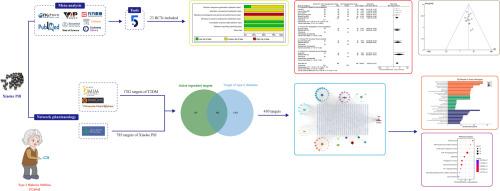Meta-analysis and network pharmacology study of Xiaoke Pill in the treatment of type 2 diabetes mellitus
IF 1.7
4区 医学
Q3 INTEGRATIVE & COMPLEMENTARY MEDICINE
引用次数: 0
Abstract
Introduction
Xiaoke Pill is a combination Chinese and Western medicine formula that combines seven Chinese herbal medicines with glibenclamide. Xiaoke Pill is widely used in China for the treatment of type 2 diabetes mellitus (T2DM), however, its overall effectiveness and mechanisms of action are yet to be fully evaluated. We conducted a systematic review to evaluate the clinical effectiveness of Xiaoke Pill compared to Western medicine only and explore its potential mechanisms of action by using network pharmacology.
Methods
Randomized controlled trials (RCTs) of Xiaoke Pill in the treatment of T2DM were obtained by searching eight databases: China National Knowledge Infrastructure (CNKI), VIP Database, Wanfang Database, China Biomedical Medicine Disc (CBM), PubMed, Embase, Cochrane Library and Web of Science. A meta-analysis was performed utilizing RevMan 5.4.1 software. The active ingredients and related targets of Xiaoke Pill were obtained by using the Traditional Chinese Medicine Systems Pharmacology (TCMSP) database. Disease targets for T2DM were acquired using the GeneCards, Online Mendelian Inheritance in Man (OMIM), and Therapeutic Target Database (TTD). The protein-protein interaction (PPI) network was constructed using the STRING database and Cytoscape 3.7.2 software. GO enrichment analysis and KEGG pathway analysis were performed using R 3.6.1 software.
Results
Twenty-three RCTs with a total of 2946 patients were included. The results of meta-analysis showed that Xiaoke Pill had significant clinical advantages in the treatment of T2DM. Compared with the use of Western medicine only, it shows better efficacy in regulating blood sugar, reducing blood lipids, and improving efficacy. The results of network pharmacology showed that neokadsurac acid A, formononetin, Schottenol were the key ingredients of Xiaoke Pill in the treatment of T2DM. The core targets were EGFR, SRC, STAT3. It mainly included prostate cancer, PI3K-Akt and HIF-1 signaling pathway.
Conclusions
Compared with Western medicine only, the clinical advantages of Xiaoke Pill in the treatment of T2DM may stem from the synergistic effect of Chinese and Western medicine components and their multi-component, multi-target and multi-pathway regulatory mechanisms. However, its improvement in blood glucose may not reach the clinically significant level, and its clinical significance still needs to be verified by more related studies.

消渴丸治疗2型糖尿病的meta分析及网络药理学研究
消咳丸是由七种中草药与格列本脲混合而成的中西医结合配方。消渴丸在中国广泛用于治疗2型糖尿病,但其整体疗效和作用机制尚未得到充分评价。我们采用网络药理学的方法,对消渴丸与单纯西药的临床疗效进行系统评价,并探讨消渴丸的潜在作用机制。方法通过检索中国知网(CNKI)、维普数据库(VIP Database)、万方数据库(Wanfang Database)、中国生物医学数据库(CBM)、PubMed、Embase、Cochrane Library和Web of Science等8个数据库,获得消可丸治疗2型糖尿病的随机对照试验(RCTs)。采用RevMan 5.4.1软件进行meta分析。利用中药系统药理学(TCMSP)数据库获得消渴丸的有效成分及相关靶点。使用GeneCards、在线孟德尔遗传(OMIM)和治疗靶标数据库(TTD)获得T2DM的疾病靶标。利用STRING数据库和Cytoscape 3.7.2软件构建蛋白-蛋白相互作用(PPI)网络。采用r3.6.1软件进行GO富集分析和KEGG通路分析。结果共纳入23项随机对照试验,共2946例患者。meta分析结果显示消咳丸治疗2型糖尿病具有显著的临床优势。与单纯使用西药相比,在调节血糖、降低血脂、提高疗效方面表现出更好的效果。网络药理学结果显示,消渴丸治疗2型糖尿病的关键成分为新苦参酸A、刺芒柄花素、雪藤酚。核心靶点为EGFR、SRC、STAT3。主要包括前列腺癌、PI3K-Akt和HIF-1信号通路。结论消渴丸治疗2型糖尿病的临床优势与单纯西药相比,可能源于中西医成分的协同作用及其多组分、多靶点、多通路的调控机制。但其对血糖的改善作用可能达不到临床显著水平,其临床意义还有待更多相关研究的验证。
本文章由计算机程序翻译,如有差异,请以英文原文为准。
求助全文
约1分钟内获得全文
求助全文
来源期刊

European Journal of Integrative Medicine
INTEGRATIVE & COMPLEMENTARY MEDICINE-
CiteScore
4.70
自引率
4.00%
发文量
102
审稿时长
33 days
期刊介绍:
The European Journal of Integrative Medicine (EuJIM) considers manuscripts from a wide range of complementary and integrative health care disciplines, with a particular focus on whole systems approaches, public health, self management and traditional medical systems. The journal strives to connect conventional medicine and evidence based complementary medicine. We encourage submissions reporting research with relevance for integrative clinical practice and interprofessional education.
EuJIM aims to be of interest to both conventional and integrative audiences, including healthcare practitioners, researchers, health care organisations, educationalists, and all those who seek objective and critical information on integrative medicine. To achieve this aim EuJIM provides an innovative international and interdisciplinary platform linking researchers and clinicians.
The journal focuses primarily on original research articles including systematic reviews, randomized controlled trials, other clinical studies, qualitative, observational and epidemiological studies. In addition we welcome short reviews, opinion articles and contributions relating to health services and policy, health economics and psychology.
 求助内容:
求助内容: 应助结果提醒方式:
应助结果提醒方式:


